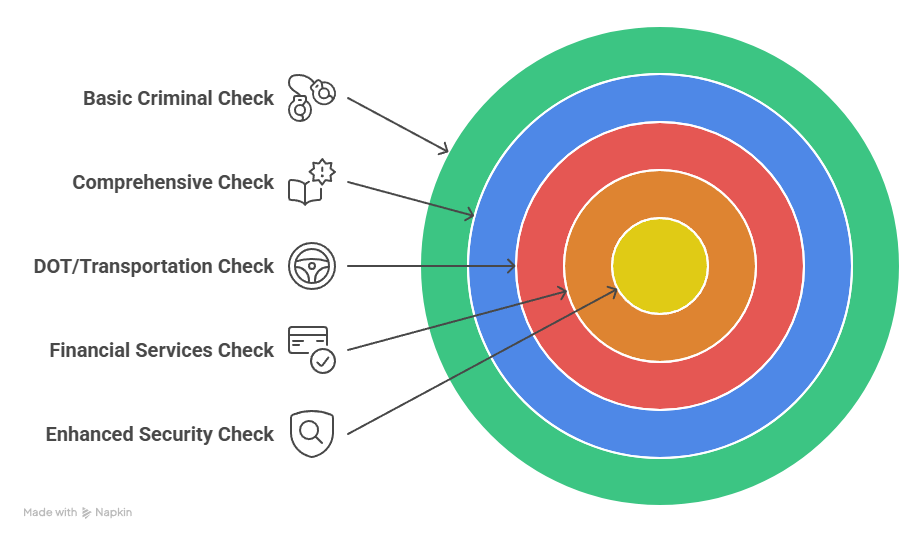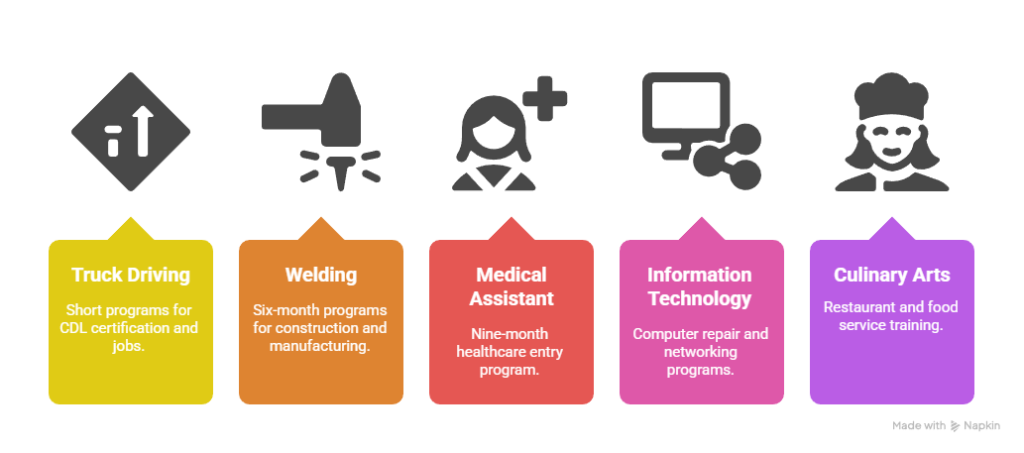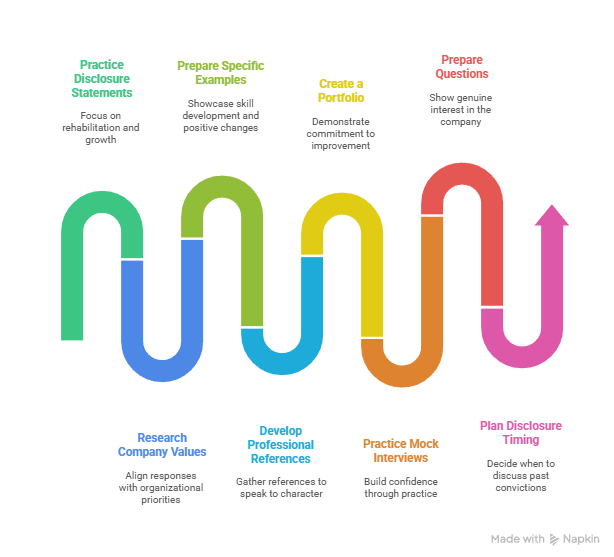Nevada offers numerous second-chance employment opportunities for individuals with criminal backgrounds, supported by progressive hiring laws and growing employer acceptance. The state's diverse economy, from hospitality to construction, provides multiple pathways for career rebuilding and financial stability.
Key Takeaways
- Nevada's Ban the Box law prohibits employers from asking about criminal history on initial job applications for most positions.
- High-demand industries like construction, hospitality, transportation, and manufacturing actively hire workers with criminal records.
- Occupational licensing restrictions exist for certain professions, but many have pathways for exceptions and appeals.
- State and nonprofit organizations provide specialized job placement services, training programs, and support resources for formerly incarcerated individuals.
- Remote work opportunities and gig economy jobs offer additional employment pathways without traditional background check barriers.
- Professional networking, skill development, and proper interview preparation significantly improve job placement success rates.
Understanding Nevada's Employment Laws for People with Criminal Records
Nevada has implemented several progressive policies that create better employment opportunities for individuals with criminal backgrounds. The state's Ban the Box legislation prohibits most employers from including questions about criminal history on initial job applications. This law allows candidates to demonstrate their qualifications before disclosure requirements come into play.
However, employers can still conduct background checks later in the hiring process. Additionally, certain positions in healthcare, education, and financial services remain exempt from these protections. Understanding these nuances helps job seekers navigate the application process more effectively.
The Nevada Equal Rights Commission enforces fair hiring practices and investigates discrimination complaints. Furthermore, the state provides legal pathways for record sealing and expungement, which can significantly improve employment prospects. These legal protections create a foundation for successful job searching and career development.
How Background Checks Work in Nevada Employment
Timeline and Process for Employment Background Checks
Nevada employers typically conduct background checks after extending a conditional job offer, following Ban the Box requirements. Most background checks take 3-7 business days to complete, depending on the screening company and scope of investigation. Employers must provide written notice before conducting background checks and allow candidates to review and dispute any inaccurate information.
The background check process usually includes criminal history verification, employment history confirmation, and reference checks. Some positions may require additional screening such as credit checks, driving record reviews, or professional license verification. Understanding this timeline helps job seekers prepare appropriate documentation and plan their job search strategy accordingly.
| Background Check Component | Typical Timeframe | Information Revealed |
| Criminal History | 1-3 days | Convictions, arrests, court records |
| Employment Verification | 2-5 days | Job titles, dates, eligibility for rehire |
| Reference Checks | 3-7 days | Work performance, character assessment |
Job seekers should prepare for background checks by gathering accurate employment dates, supervisor contact information, and documentation of any criminal history. Being proactive about potential findings allows candidates to address concerns before they become problems. This preparation demonstrates responsibility and transparency to potential employers.
What Shows Up on Background Checks in Nevada
Nevada background checks typically reveal felony and misdemeanor convictions, pending criminal cases, and arrest records from the past seven years. However, the state allows employers to consider conviction records indefinitely for certain positions. Dismissed charges, expunged records, and juvenile offenses generally don't appear on standard employment background checks.
Traffic violations, civil judgments, and bankruptcy filings may appear depending on the type of background check requested. Additionally, some employers conduct social media screenings or internet searches as part of their hiring process. Understanding what information is accessible helps job seekers prepare appropriate responses and disclosure strategies.
Different background check levels provide varying amounts of information:

- Basic Criminal Check: Local and state criminal records, typically 7-10 years
- Comprehensive Check: Multi-state criminal records, employment history, references, education verification
- Enhanced Security Check: Federal records, credit history, social media screening, professional license verification
- DOT/Transportation Check: Driving records, drug test history, vehicle operation violations
- Financial Services Check: Credit history, banking violations, securities industry records
Some industries require specialized background checks with specific requirements. For example, healthcare positions often require fingerprint-based FBI checks, while transportation jobs focus heavily on driving records. Understanding industry-specific requirements helps job seekers target appropriate opportunities and prepare for screening processes.
Top Industries Hiring Felons in Nevada
Hospitality and Tourism Sector
Las Vegas and Reno's massive hospitality industry represents the largest employment opportunity for people with criminal records in Nevada. Hotels, casinos, restaurants, and entertainment venues frequently hire individuals with non-violent backgrounds for various positions. Entry-level roles include housekeeping, food service, security, and customer service positions.
Major employers like MGM Resorts, Caesars Entertainment, and Station Casinos have implemented second-chance hiring programs. These companies often provide on-the-job training and advancement opportunities. The industry's high turnover rate creates continuous job openings throughout the year.
| Position Type | Average Starting Wage | Common Requirements |
| Housekeeper | $15-18/hour | Background check, drug test |
| Food Server | $12/hour + tips | Food handler's permit, clean appearance |
| Security Guard | $16-20/hour | Security license, training certification |
Career advancement in hospitality often happens quickly for dedicated employees. Many property managers and department supervisors started in entry-level positions. The industry values work ethic and customer service skills over educational credentials.
Construction and Skilled Trades
Nevada's booming construction industry actively recruits workers with criminal backgrounds, especially for physically demanding roles. The state's ongoing development projects create consistent demand for construction laborers, equipment operators, and skilled tradespeople. Many construction companies focus more on work ability than criminal history.
Union apprenticeship programs offer excellent pathways into high-paying careers. The International Brotherhood of Electrical Workers (IBEW) and other trade unions in Nevada have programs specifically designed to help individuals with criminal backgrounds enter skilled trades. These programs combine classroom instruction with paid on-the-job training.
Additionally, the construction industry provides opportunities for entrepreneurship and independent contracting. Many successful contractors started as laborers and gradually built their own businesses. These factors make construction an attractive long-term career option for many formerly incarcerated individuals.
Transportation and Logistics
The transportation sector offers numerous opportunities, though some positions have restrictions based on the nature of criminal convictions. Local delivery drivers, warehouse workers, and logistics coordinators represent accessible entry points. Companies like Amazon, FedEx, and UPS have facilities throughout Nevada and often hire individuals with criminal records.
Commercial driving positions may require additional screening, but many companies will consider candidates with older or non-violent convictions. Furthermore, the rise of gig economy platforms creates opportunities for independent income generation. These flexible options allow individuals to build work history while searching for traditional employment.
Companies with Second-Chance Hiring Policies
Several major employers in Nevada have established formal second-chance hiring programs that actively recruit individuals with criminal backgrounds. These companies recognize the value of providing employment opportunities while addressing their workforce needs. Their policies often include comprehensive support systems for new hires.
- Walmart and Sam's Club: Hire for various retail positions, focusing on rehabilitation over past mistakes, with comprehensive training programs and advancement opportunities
- Home Depot and Lowe's: Offer construction-related retail jobs with advancement opportunities, emphasizing skills development and customer service training
- Starbucks: Provides barista positions with comprehensive benefits and education assistance programs, including tuition coverage for online degrees
- Tyson Foods: Manufacturing positions with competitive wages and stable employment, offering overtime opportunities and career advancement paths
- Waste Management: Sanitation and recycling jobs with good benefits and job security, including health insurance and retirement planning
- Amazon: Warehouse and delivery positions with flexible scheduling and opportunities for skill development in logistics and technology
These companies typically evaluate candidates on a case-by-case basis. They consider factors like time since conviction, job relevance, and evidence of rehabilitation. Many also provide mentorship programs and additional support services to ensure employee success.
Most second-chance employers offer comprehensive training programs that don't require previous experience. This approach allows individuals to develop new skills while earning income. Additionally, many of these companies have strong promotion-from-within policies that reward dedication and performance.
Professional Licensing Restrictions and Solutions
Occupations with Licensing Barriers
Nevada law restricts certain professional licenses for individuals with specific criminal convictions. Healthcare positions, including nursing and medical technician roles, have strict background requirements. Financial services, real estate, and legal professions also maintain significant barriers for people with criminal records.
However, the state has implemented review processes that allow for individual consideration of licensing applications. Many licensing boards now focus on conviction relevance to job duties rather than blanket prohibitions. This shift creates more opportunities for qualified individuals to enter licensed professions.
| Licensed Profession | Restriction Level | Appeal Process Available |
| Nursing | High | Yes, with rehabilitation evidence |
| Real Estate | Moderate | Case-by-case review |
| Security Guard | Low | Training can overcome most barriers |
Professional licensing appeals require thorough preparation and often benefit from legal assistance. Successful appeals typically demonstrate rehabilitation, community involvement, and relevant education or training. The process can be lengthy, but many individuals have successfully obtained professional licenses despite criminal backgrounds.
Alternative Career Paths
When traditional licensed professions aren't accessible, many alternative careers offer similar satisfaction and income potential. For example, individuals interested in healthcare can pursue medical equipment technician or medical administrative roles. Those drawn to real estate might consider property management or real estate photography.
The technology sector offers numerous opportunities that don't require professional licensing. Web development, digital marketing, and computer support roles focus on skills and portfolio work rather than formal credentials. Additionally, entrepreneurship and independent contracting provide pathways to professional success without traditional employment barriers.
Job Search Strategies and Resources
Government and Nonprofit Employment Services
Effective job searching for individuals with criminal records requires strategic planning and resource utilization. Nevada provides numerous specialized services designed to help formerly incarcerated individuals find employment. These resources include job placement agencies, training programs, and support networks.
The Nevada Department of Employment offers dedicated reentry services through local offices. Staff members understand the unique challenges faced by individuals with criminal records and provide targeted assistance. Services include resume writing, interview preparation, and direct employer connections.
- Nevada JobConnect Centers: Provide career counseling, job matching, and skills assessment services with dedicated reentry specialists
- Goodwill of Southern Nevada: Offers job training programs and placement assistance specifically for individuals with barriers to employment
- WestCare Nevada: Provides comprehensive reentry services including employment assistance and life skills training
- Las Vegas-Clark County Library District: Offers free computer access, resume assistance, and job search workshops
- Catholic Charities of Southern Nevada: Employment services and support programs for individuals facing employment barriers
Online job searching requires careful attention to application strategies. Many successful job seekers recommend focusing on smaller companies that may be more flexible in their hiring practices. Additionally, temporary staffing agencies can provide opportunities to demonstrate work ethic and reliability to potential permanent employers.
Networking and Professional Development
Networking plays a crucial role in successful job placement for individuals with criminal records. Building professional relationships through volunteer work, community involvement, and industry associations creates opportunities that may not be advertised publicly. These connections often lead to the most successful job placements.
Professional development activities demonstrate commitment to growth and improvement. Attending industry conferences, participating in professional organizations, and completing continuing education courses all contribute to a stronger job application. These activities also provide networking opportunities and industry knowledge that can be valuable during interviews.
Training Programs and Skill Development
Vocational Education Opportunities
Nevada's community college system offers numerous vocational programs designed to provide marketable skills in high-demand industries. The College of Southern Nevada and Truckee Meadows Community College both offer programs specifically designed for adult learners and career changers. Many programs can be completed in less than two years.
Trade-specific training programs focus on skills that are immediately applicable in the workforce. Welding, automotive repair, and HVAC certification programs have high job placement rates. These skills-based programs often lead directly to employment opportunities with good wages and advancement potential.
Popular vocational programs include:

- Commercial Truck Driving: 4-6 week programs leading to CDL certification and immediate job placement opportunities with starting wages of $45,000-55,000 annually
- Welding Certification: 6-month programs with high starting wages and strong job security in construction and manufacturing sectors
- Medical Assistant Training: 9-month programs providing entry into the healthcare field without extensive background restrictions
- Information Technology: Computer repair and networking programs with growing demand across all industries and remote work potential
- Culinary Arts: Restaurant and food service training with immediate application in Nevada's large hospitality industry
Financial aid and scholarships are available for many programs, making education accessible regardless of economic circumstances. Additionally, some programs offer evening and weekend classes to accommodate work schedules. These flexible options allow individuals to improve their skills while maintaining income.
Online Learning and Certification
Digital skills training has become increasingly important in today's job market. Many employers value certifications in software applications, digital marketing, and basic computer skills. Online learning platforms offer flexible scheduling and affordable access to professional development.
Free and low-cost certification programs are available through libraries, community organizations, and online platforms like Coursera, edX, and Khan Academy. These certifications can significantly improve job prospects and starting wages. Furthermore, online learning allows individuals to develop skills while searching for employment.
Remote Work and Gig Economy Opportunities
The rise of remote work and gig economy platforms has created new opportunities for individuals with criminal records to earn income and build professional experience. Many remote positions focus on skills and work quality rather than background checks, especially for freelance and contract work. This shift has opened doors that were previously closed to many job seekers.
Popular gig economy opportunities include rideshare driving, food delivery, freelance writing, virtual assistance, and online tutoring. These platforms often have less stringent background check requirements and allow individuals to work flexible schedules while building income. Additionally, success in gig work can demonstrate reliability and work ethic to future employers.
- DoorDash and Uber Eats: Food delivery services with flexible scheduling and immediate income potential
- TaskRabbit: Handyman and moving services that leverage construction and manual labor skills
- Upwork and Fiverr: Freelance platforms for writing, graphic design, data entry, and virtual assistance
- Rover: Pet sitting and dog walking services for animal lovers
- Instacart: Grocery shopping and delivery service with flexible hours
Building a successful gig economy career requires dedication to customer service and professional communication. Many individuals use these platforms as stepping stones to traditional employment or to build their own businesses. The flexibility and income potential make gig work an attractive option for many people with criminal backgrounds.
Remote work opportunities in traditional employment have also expanded significantly. Customer service, data entry, content moderation, and technical support roles are increasingly available as remote positions. These jobs often provide benefits and career advancement opportunities while eliminating geographic barriers to employment.
Interview Preparation and Disclosure Strategies

Successful interviewing with a criminal background requires careful preparation and strategic thinking about disclosure timing and methods. Nevada's Ban the Box law provides some protection, but candidates must still be prepared to address their background professionally when the topic arises. Honest, prepared responses typically yield better results than avoidance or deception.
The key to successful disclosure lies in focusing on rehabilitation, growth, and current qualifications rather than dwelling on past mistakes. Employers want to understand how past experiences have contributed to personal development and work readiness. Demonstrating accountability while emphasizing positive changes creates confidence in hiring decisions.
Preparation strategies include practicing disclosure statements, researching company values and culture, and preparing specific examples of personal growth and skill development. Additionally, having professional references who can speak to character and work ethic strengthens the overall application. These references should be prepared to address background concerns positively and professionally.
Mock interviews with career counselors or support group members help refine communication skills and build confidence. Many job seekers find that multiple practice sessions significantly improve their comfort level with difficult questions. This preparation translates to more successful actual interviews and job offers.
Conclusion
Nevada offers substantial opportunities for individuals with criminal backgrounds to rebuild their careers and achieve financial stability. The state's progressive employment laws, diverse economy, and growing acceptance of second-chance hiring create multiple pathways to success. With proper preparation, strategic job searching, and utilization of available resources, individuals can overcome employment barriers and build fulfilling careers. Success requires patience, persistence, and a commitment to personal and professional growth, but the opportunities for meaningful employment continue to expand across Nevada's job market.
Frequently Asked Questions
Can employers in Nevada ask about criminal history on job applications?
Nevada's Ban the Box law prohibits most employers from asking about criminal history on initial job applications. However, they can conduct background checks later in the hiring process for most positions.
What industries in Nevada are most likely to hire people with criminal records?
Construction, hospitality, transportation, manufacturing, and retail are the most accessible industries. These sectors often focus more on current skills and work ethic than criminal background.
Are there any jobs that people with felony convictions cannot do in Nevada?
Certain positions in healthcare, education, financial services, and law enforcement have restrictions. However, many restrictions can be appealed or waived based on individual circumstances and rehabilitation evidence.
How long should I wait after my conviction to start applying for jobs in Nevada?
There's no required waiting period for most jobs. Many employers are willing to hire immediately upon release, especially in industries with second-chance hiring policies.
Can I get professional licenses in Nevada with a criminal record?
It depends on the profession and type of conviction. Many licensing boards now consider individual circumstances and rehabilitation evidence rather than imposing blanket prohibitions.
What should I do if I'm denied employment because of my criminal background?
You can file a complaint with the Nevada Equal Rights Commission if you believe you've faced illegal discrimination. Additionally, consider seeking legal advice about your specific situation and potential appeals processes.
Additional Resources
- Nevada Department of Employment, Training & Rehabilitation – Reentry Services
https://detr.nv.gov/ - Nevada JobConnect Centers – Career Services and Job Placement
https://nevadajobconnect.com/ - Goodwill of Southern Nevada – Employment Training Programs
https://www.goodwillsn.org/ - WestCare Nevada – Reentry and Employment Services
https://www.westcare.com/ - Nevada Equal Rights Commission – Employment Discrimination Information
https://detr.nv.gov/Page/Nevada_Equal_Rights_Commission - College of Southern Nevada – Workforce Development Programs
https://www.csn.edu/ - Catholic Charities of Southern Nevada – Employment Assistance
https://www.catholiccharities.com/ - Las Vegas-Clark County Library District – Career Resources
https://lvccld.org/

GCheck Editorial Team
Meet the GCheck Editorial Team, your trusted source for insightful and up-to-date information in the world of employment background checks. Committed to delivering the latest trends, best practices, and industry insights, our team is dedicated to keeping you informed.
With a passion for ensuring accuracy, compliance, and efficiency in background screening, we are your go-to experts in the field. Stay tuned for our comprehensive articles, guides, and analysis, designed to empower businesses and individuals with the knowledge they need to make informed decisions.
At GCheck, we're here to guide you through the complexities of background checks, every step of the way.





